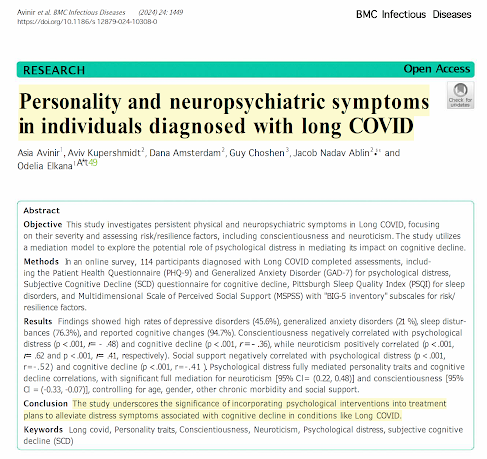Long COVID, also known as post-COVID-19 condition, is a complex syndrome affecting individuals who have previously had COVID-19. While the initial symptoms of COVID-19 may resolve, long COVID can persist for weeks, months, or even years. A recent study published in the journal Frontiers in Psychiatry delves into the relationship between personality traits and neuropsychiatric symptoms in individuals diagnosed with long COVID.
The Study
The study, titled "Personality and neuropsychiatric symptoms in individuals diagnosed with long COVID," was conducted by a team of researchers from Israel. They aimed to investigate the potential link between personality traits and the development of neuropsychiatric symptoms in long COVID patients.
Key Findings
The study found that individuals with long-term COVID-19 who exhibited higher levels of neuroticism were more likely to experience depression, anxiety, and other neuropsychiatric symptoms. Neuroticism is a personality trait characterized by negative emotions such as anxiety, worry, fear, anger, frustration, envy, jealousy, guilt, and sadness.
The researchers also found that conscientiousness, another personality trait, was associated with a lower risk of developing neuropsychiatric symptoms in long COVID patients. Conscientiousness is a personality trait characterized by high levels of thoughtfulness, good impulse control, and goal-directed behaviors.
Findings showed high rates of depressive disorders (45.6%), generalized anxiety disorders (21%), sleep disturbances (76.3%), and reported cognitive changes (94.7%). Conscientiousness negatively correlated with psychological distress (p < .001, r = - .48) and cognitive decline (p < .001, r = - .36), while neuroticism positively correlated (p < .001, r = .62 and p < .001, r = .41, respectively). Social support negatively correlated with psychological distress (p < .001, r = - .52) and cognitive decline (p < .001, r = - .41). Psychological distress fully mediated personality traits and cognitive decline correlations, with significant full mediation for neuroticism [95% CI = (0.22, 0.48)] and conscientiousness [95% CI = (-0.33, -0.07)], controlling for age, gender, other chronic morbidity and social support.
Implications
The findings of this study suggest that personality traits play a role in the development of neuropsychiatric symptoms in long COVID patients. These findings could have important implications for preventing and treating long COVID. For example, interventions that target neuroticism and promote conscientiousness may reduce the risk of developing neuropsychiatric symptoms in long COVID patients.
These findings will support claims in workers' compensation for treatment and disability awards.
Conclusion
The study on personality and neuropsychiatric symptoms in long COVID is important in understanding the complex syndrome. The findings suggest that personality traits play a role in the development of neuropsychiatric symptoms in long COVID patients. These findings could have important implications for the prevention and treatment of long COVID.
Personality and neuropsychiatric symptoms in individuals diagnosed with long COVID, BMC Infect Dis, 2024 Dec 19;24(1):1449. doi: 10.1186/s12879-024-10308-0
Related Articles: Workers’ Compensation Benefits for Long COVID
jon@gelmans.com has represented injured workers and their families who have suffered occupational illnesses and diseases.
LinkedIn: JonGelman
LinkedIn Group: Injured Workers Law & Advocacy Group
Author: "Workers' Compensation Law" West-Thomson-Reuters
Mastodon:@gelman@mstdn.social
Blue Sky: jongelman@bsky.social
© 2025 Jon L Gelman. All rights reserved.
Attorney Advertising
Prior results do not guarantee a similar outcome.


